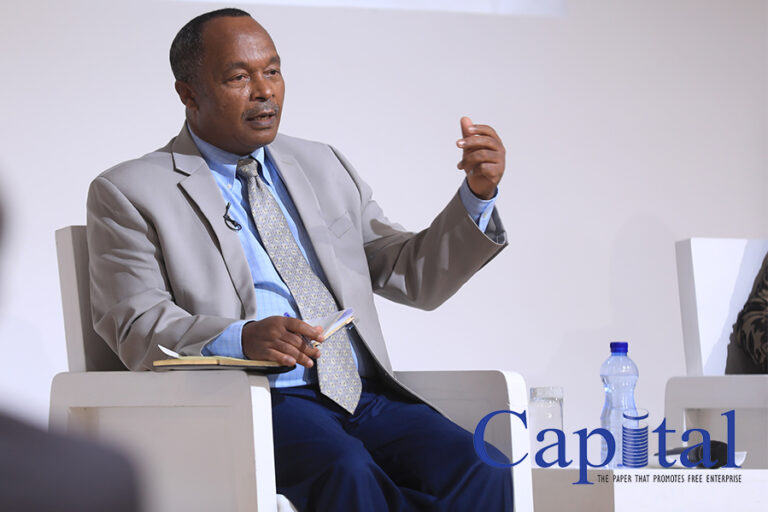The agriculture policy that includes new development strategies is tabled for ratification to the Council of Ministers.
The policy replaces the two-decade old way of doing things and is stated as to support some agricultural practices to get legal bandage whilst introducing a new systems and laws for the agricultural sector.
The new policy has ten major pillars that include promoting inclusive development in the agriculture sector with the consideration of the pastoralist and lowland development.
Mandefro Nigussie, CEO of Agricultural Transformation Agency (ATA), said that the policy will allow designing supportive proclamations and other laws for the agriculture development.
“We put some policy changes on land, technology, extension advisory, input, water, rural finance and many more that needs legal bandage to see agricultural transformation,” he said.
“For instance, agricultural practice through cluster is expanding in the country but it does not have a legal framework. When the new policy is ratified, we will develop laws that will support the system,” Mandefro told Capital.
Similarly, the policy is also considering technologies including biotech to be in place in the coming ten years’ time.
Experts said that there are some agendas that need holistic changes with regards to promoting inclusive agriculture and rural development on the consideration of irrigation, financing, land issue, sustainable development, natural resource development, mechanization and others.
Regarding finance, the new scheme is expected to be promoted to expand access to finance for the agriculture sector.
Currently the agriculture sector is not benefiting from the required finance meanwhile it is the backbone of the country’s economy.
It needs special attention regarding to finance like any other sector, the CEO says “currently most financing are short term, but by its nature agriculture requires long term loan. Due to that it needs a financial institution that has the required modality.”
Similarly the other attention will be mechanization on the agriculture practices by supporting farmers to use modern technologies.
Under the new policy the role of the private sector will also be expanded in all aspects including research, extensions, input supply and dispatch, and even involve on leasing an irrigation scheme.
The policy has considered an integrated approach on social and economic dimension and environmental issue.
The policy has 10 main agendas, 44 sub agendas and 215 implementation instruments.
New agricultural policy tabled for ratification
Safaricom signs deal with Nokia
Safaricom Telecommunications Ethiopia Plc, signed an agreement with the global telecom giant Nokia for its infrastructure development for its operation in Ethiopia. It is also finalizing the negotiation with the Chinese global telecom giants Huawei.
Safaricom Ethiopia that was formed by the amalgamation of Safaricom, Sumitomo Corporation, CDC Group and Vodacom has secured operational license from the government early June 2021 officially to do business in Ethiopia as a second telecom company after the state owned Ethio Telecom.
Additional to Nokia previously the company shortlisted the Chinese global telecom giants Huawei to set up its infrastructure. Safaricom has signed its agreement with Nokia last week.
The company is also talking with Huawei Technologies of the Chinese multinational technology corporation for the infrastructure development that it aspires to realize in a short period.
To get the license it has paid USD 850 million to the government and promised to invest up to USD 8.5 billion in the coming decade.
The company has already disclosed that it will launch the operation in the first half of mid-2022.
The company is now starting engagements with Ethio Telecom, which is expected to provide rental service of its infrastructure for the new telecom operator.
Currently safaricom has about 120 staffs in which only 10 of them are Ethiopians, working with both virtual and personal meeting from Africa, Europe and Asia. Due to the fear of the current instability in the country the company has sent its non-Ethiopian staffs to their home country.
“We will continue to work virtually and this will not affect our plan” said one of the staff.
Awarded on May 2021, the company has set up its temporary office at Hyatt Regency hotel.
Furthermore on Friday the company has released expression of interest to recruit partners who can distribute its products and services including airtime, mobile telephones and sim-cards. Also to start putting its rooftop and indoor sites over the country the company has called eligible bidders to lease sites in 8 cities around the country.
Berhan Bank appoints acting President
Berhan Bank has appointed Bethlehem Getachew as its acting president after the resignation of its president Abraham Alaro this week.
On Wednesday November 5, 2021 Abraham Alaro who has been serving the bank as president starting from 2014 has submitted his resignation letter to the Board of Directors informing them his resignation on the basis of personal matter.
In a statement sent to capital, Berhan Bank has said that the board of the directors are discussing on the resignation letter but to fill the gap and continue the daily activities of the bank the board has decided to appoint Bethlehem as acting president. According to the statement Bethlehem will take the presidency until a replacement is appointed.
Starting from March 2013 up to September 2014 Abraham has been working at the bank as vice president and since September 2014 he has been serving as president.
Bethlehem is currently serving the bank as Vice President on Customer Service and Quality Assurance
Berhan Bank was registered and licensed by the National Bank of Ethiopia on 27 June 2009 with a paid up capital of Birr 95.7 Million divided in to shares of Birr 1,000 and an authorized capital of Birr 300 Million. Berhan Bank S.C started operation on October 30, 2009. Currently the initial capital of Berhan bank stands at 3 billion birr.
In its latest annual report of the 2019/20 year, on January 2021 Berhan Bank has expanded its revenue by 30 percent in the financial year concluded in June, while the profit has climbed by 22 percent. The bank managed to register 2.8 billion birr revenue up from 2.2 billion birr in the 2018/19 financial year.
The interest expenses have also increased by 35 percent and reached at 818 billion birr from 605 million birr which Berhan has achieved massive progresses like the income and profit in other measurements in the year.
Peace be the ultimate goal
The majority of ongoing armed conflicts today started before the turn of the century. Such long-running conflicts cause enormous human suffering and are highly destructive. They lead to internal displacement and migration, destroy a country’s key infrastructure, and divert resources away from productive activities and investment in public health and education. The instability caused by these conflicts has spillover effects on neighboring countries and can often destabilize an entire region. A key characteristic of such protracted conflicts is their apparent resistance to any negotiated settlement. Leaders of parties to such conflicts refuse to enter into negotiations, stall progress in talks, escalate violence at critical moments or make hardline statements that render productive negotiations all but impossible. This poses a key puzzle: why do conflict parties fail to negotiate a conflict settlement, even when they know that war is costly?
Bargaining theorists primarily attribute bargaining failures to information problems: because parties have an interest in exaggerating their own capabilities and resolve, they do not trust each other’s information, which may lead to a situation where one or both parties overestimate their relative strength. In these situations, they may believe that they can achieve more through continued fighting than through settlement. After long periods of fighting, their assessments of the expected military outcome should converge, revealing a range of mutually preferable agreements. But even when both sides would prefer a negotiated agreement, they may fail to reach settlement, if they cannot credibly commit to implementing a peace agreement. Other common explanations for protracted conflicts include the indivisibility of stakes and the presence of war entrepreneurs. Scholars from the sociopsychological peace and conflict studies focus on a very different set of factors, such as social identity and hatred, to explain protracted conflicts. These explanations often present a competing logic, leading to contradicting expectations about conditions that foster conflict settlement.
Most bargaining models represent conflict parties as abstract, rational entities. These entities care only about their own welfare. If they care about gains of the other side, they essentially do so because relative gains by the opponent may affect one’s own welfare in the future. Such self-centered preferences imply that wars are just like ordinary bargaining situations and that-strategic considerations about future interactions aside-conflict parties evaluate an agreement irrespective of whom they are negotiating with.
Scholars studying the relationships between social identity, group dynamics, and hatred would reject such a suggestion as nonsensical. A central question to these scholars is how social identity shapes conflict, and vice versa. Even without conflict, humans tend to pursue a sense of belonging through the creation of social groups: in-group, to which we belong, and out-groups, from which we distinguish ourselves. Such categorizations provide us with a way to identify ourselves in social terms and to define our place in society. Because most of us strive to create or maintain a positive social identity, we tend to distinguish or differentiate our in-group from the out-group in favourable terms. Intergroup competition expands the perceived distance between the in- and out-group: it increases the social identification of individuals with their own group and leads them to view and treat members of the other group as members of that group, rather than as individuals. War is an extreme form of intergroup competition, where individuals tend to have strong social identification with their in-group and strong hatred for the out-group. While conflict party members may already negatively identify with the other side before the onset of war, hatred will likely intensify when fighting breaks out. For individuals tend to see violent acts by their own groups as necessitated by the opponent’s behavior, while viewing violent acts by the opponent as intentional and malicious (and thus necessitating counter-attacks). Leaders who engage in war have an incentive for further polarization, as hatred for an out-group mobilizes political support, creates cohesion and unity, and helps legitimize a violent course of action. Hatred may thus exist before the onset of war, but it will likely intensify and become entrenched as war breaks out and fighting persists.
Naturally, leaders do not calculate support through some elaborate calculation; instead, they use heuristics to gauge whether a policy decision to engage in, stay in, or conclude negotiations enjoys a minimum of required support from key constituents. Leaders may actively communicate progress in talks or leak interim agreements to gauge the reaction of the public, the media, or specific constituent groups. Opinion polls, consultations with key opinion makers, and editorial comments in mainstream media are other examples of ways to help leaders determine whether negotiations or an eventual agreement have sufficient constituent support.
With the exception of those who profit from the instability that war brings, everyone wants peace-but not necessarily at all costs. Integrating the above insights into bargaining theory allows discussing preferred policy options from the perspective of individual members of conflict parties, showing how hatred, ongoing hostilities, and war narratives negate space for a negotiated settlement.






